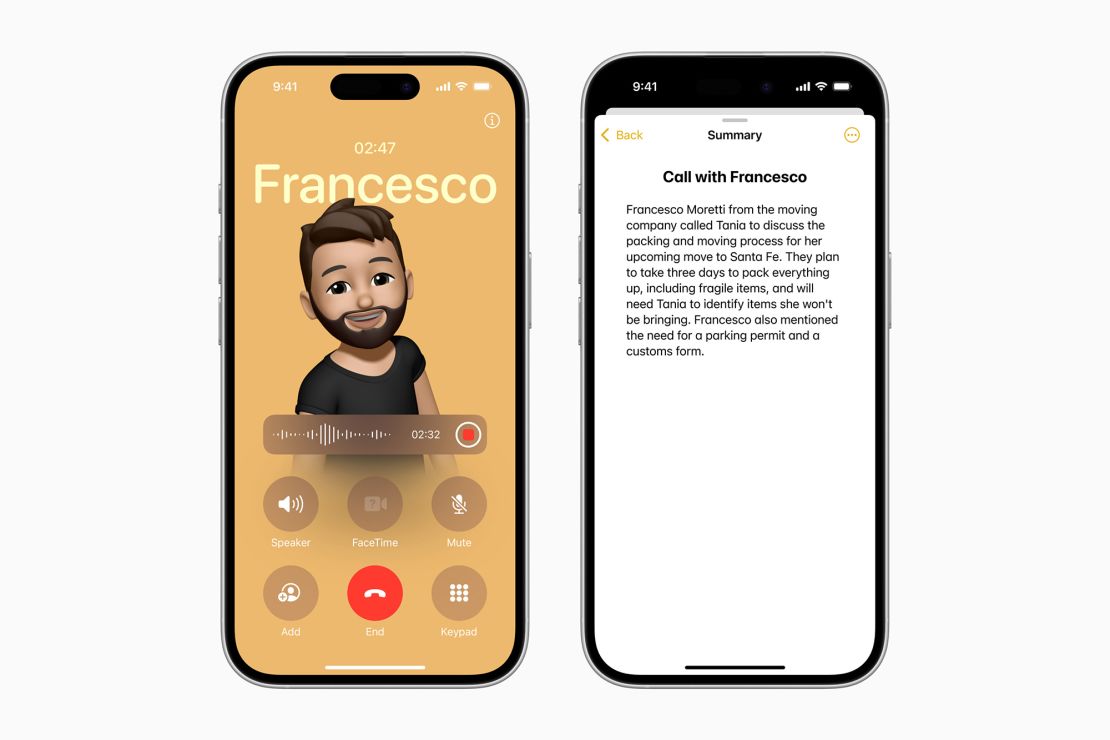Apple Intelligence launched on Monday, but the rollout is just a glimpse of how Apple hopes to transform its products with artificial intelligence.
The tech giant unveiled initial features of Apple Intelligence — its suite of AI tools — on select devices with its latest software update for iPhones, iPads and Macs.
Apple’s AI features for iPhones will be available for free to users with any iPhone 16, iPhone 15 Pro and Pro Max, who update to iOS 18.1. Apple Intelligence is also available for iPad and Mac models that support iPadOS 18.1 and macOS Sequoia 15.
With Apple Intelligence, the company is implementing its first set of generative AI tools that aim to change how people use their iPhones and cement Apple’s stake in the AI race against competitors like Microsoft and Google. Generative AI is the technology that produces unique text and images in response to user-prompts — from obscure images to relentlessly catchy music.
The release of Apple Intelligence comes on the heels of the iPhone 16 release in September, which is equipped with chip hardware designed to support Apple’s AI-powered features.
A pivot to AI has been a focus for Apple since it first unveiled the suite of Apple Intelligence features at the annual Worldwide Developers Conference in June. Implementing new generative AI is at the forefront of Big Tech ambitions to maintain exponential growth, and after years of sluggish sales, Apple is betting on AI to boost its performance and reinvigorate its consumer base.
The AI features rolling out with iOS 18.1
The Apple Intelligence features rolling out Monday include improvements to writing and editing, Siri and the Photo app.
Apple Intelligence’s Writing Tools bring users improved proofreading, summarizing and editing features. Another focus of the release is Siri, which is supposed to become “more natural and conversational” with Apple Intelligence, and will appear as a glowing light when activated.
With the software update, Apple says the Photos app is “more intelligent,” with the ability to search for photos and videos by typing visual descriptions, like what someone was wearing. Users will also be able to edit photos and remove unwanted visual elements with another new feature called Clean Up.
Additionally, users will be able to record and transcribe calls, with Apple Intelligence providing a summary.

Users will be able to record and transcribe audio in the Phone and Notes apps, and Apple Intelligence will summarize the transcript.
Apple Intelligence’s features most likely fit into the “nice to have” category rather than necessary features most new phone buyers actively seek, however.
Angelo Zino, a technology analyst at CFRA Research, told CNN in September that “you need to wait for word of mouth to trickle through the consumer base over the next couple of quarters” before consumers will see the value of the new technology.
And Apple’s loyal customers or AI-curious consumers who were intrigued by images of Apple’s new AI-generated “Genmoji” may feel underwhelmed by this launch, as many new features, like Image Wand — which lets users turn sketches into AI-generated images — won’t be available until at least December, when iOS 18.2 debuts.
While the first set of Apple Intelligence features might leave some iPhone users wondering if that’s all there is to it, some analysts are bullish on Apple’s plan to implement AI across its products, largely thanks to the company’s large position in the market.
Dan Ives, a managing director and senior equity analyst at Wedbush Securities, said in a note Sunday that the rollout is the start of what will be an evolving process. “Consumer AI will go through Apple’s ecosystem with over 20% of the world’s population ultimately interacting with AI on an Apple device the next few years,” Ives said.
Apple is betting big on AI to boost its sales, and the rollout follows the iPhone 16 release, which didn’t initially sell as well as Apple may have hoped. Apple sold just an estimated 37 million units in the first weekend of iPhone 16 pre-sales, down more than 12% compared to the same period last year, according to a blog post from Ming-Chi Kuo, an Apple analyst with TF International Securities.
Additionally, Apple recently cut orders for iPhone 16s by about 10 million units through the end of 2024 and into 2025, according to another blog post by Kuo. That cut will result in less production of iPhones, he noted. According to Kuo, iPhone production for the fourth quarter of 2024 is now forecast at around 80 million, down year-over-year from 84 million.
Kuo noted that he did not think Apple Intelligence would immediately boost Apple’s prospects for better sales.
“Some market participants are optimistic that Apple Intelligence could dramatically boost iPhone shipments soon,” Kuo said in the blog post. “However, Apple’s recent order cuts suggest this optimistic expectation may not materialize in the short term.”
The first rollout of Apple Intelligence features are available on devices with language settings set to American English. The ability to use Apple Intelligence in other languages like French or Japanese will roll out in 2025.

Customers line-up inside the Apple Store, Regent Street on September 20, 2024 in London, England. Following Apple's new product announcements, customers can pick up the new iPhone 16, 16 Plus, 16 Pro and 16 Pro Max, Apple Watch Series 10, AirPods 4, AirPods Pro 2 and AirPods Max from UK Apple Stores today.
Apple promises more to come for December
A bigger slate of AI features is expected in December when Apple debuts iOS 18.2, inclinding “Genmoji,” a feature that lets users create their own emoji, along with ChatGPT-powered Siri and Writing Tools.
Apple is also planning to introduce a “visual intelligence experience” which would allow iPhone 16 users to hover their iPhone camera over objects and retrieve real-time information.
Wedbush’s Ives said the implementation of Apple Intelligence will produce positive long-term results for the company.
“This will be a multi-year AI journey that will define the future for Apple with its next generation chip architecture, hardware releases and future iPhone models built around the AI foundation that many consumers will ultimately embrace,” Ives said in a note.
CFRA Research’s Zino said Apple’s December rollout should prove more impactful than the October release.
“We do not expect the Apple Intelligence capabilities rolling out this week to have a notable impact on consumer behavior and Apple-related product sales,” Zino said in an email to CNN. “Planned Apple Intelligence new features expected in December and early 2025 will be much more impactful to the company’s ecosystem, in our view, and will be viewed favorably by Apple’s installed base.”
Apple (AAPL) will report its quarterly earnings on Thursday. Shares of Apple on Monday closed at $233.40, a gain of $1.99, or 0.86%.
 中文
中文 English
English





